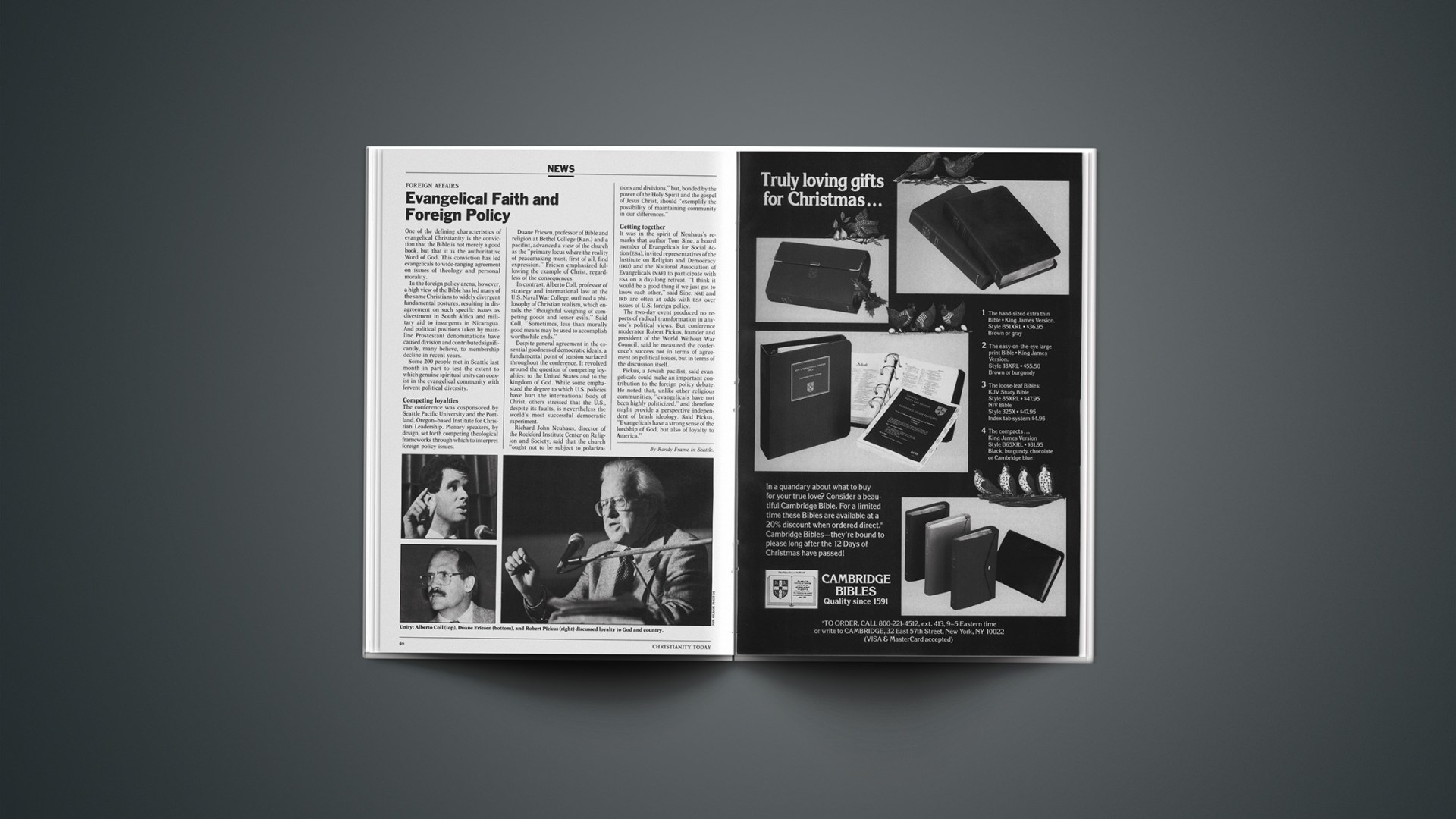FOREIGN AFFAIRS
One of the defining characteristics of evangelical Christianity is the conviction that the Bible is not merely a good book, but that it is the authoritative Word of God. This conviction has led evangelicals to wide-ranging agreement on issues of theology and personal morality.
In the foreign policy arena, however, a high view of the Bible has led many of the same Christians to widely divergent fundamental postures, resulting in disagreement on such specific issues as divestment in South Africa and military aid to insurgents in Nicaragua. And political positions taken by mainline Prostestant denominations have caused division and contributed significantly, many believe, to membership decline in recent years.
Some 200 people met in Seattle last month in part to test the extent to which genuine spiritual unity can coexist in the evangelical community with fervent political diversity.
Competing Loyalties
The conference was cosponsored by Seattle Pacific University and the Portland, Oregon-based Institute for Christian Leadership. Plenary speakers, by design, set forth competing theological frameworks through which to interpret foreign policy issues.
Duane Friesen, professor of Bible and religion at Bethel College (Kan.) and a pacifist, advanced a view of the church as the “primary locus where the reality of peacemaking must, first of all, find expression.” Friesen emphasized following the example of Christ, regardless of the consequences.
In contrast, Alberto Coll, professor of strategy and international law at the U.S. Naval War College, outlined a philosophy of Christian realism, which entails the “thoughtful weighing of competing goods and lesser evils.” Said Coll, “Sometimes, less than morally good means may be used to accomplish worthwhile ends.”
Despite general agreement in the essential goodness of democratic ideals, a fundamental point of tension surfaced throughout the conference. It revolved around the question of competing loyalties: to the United States and to the kingdom of God. While some emphasized the degree to which U.S. policies have hurt the international body of Christ, others stressed that the U.S., despite its faults, is nevertheless the world’s most successful democratic experiment.
Richard John Neuhaus, director of the Rockford Institute Center on Religion and Society, said that the church “ought not to be subject to polarizations and divisions,” but, bonded by the power of the Holy Spirit and the gospel of Jesus Christ, should “exemplify the possibility of maintaining community in our differences.”
Getting Together
It was in the spirit of Neuhaus’s remarks that author Tom Sine, a board member of Evangelicals for Social Action (ESA), invited representatives of the Institute on Religion and Democracy (IRD) and the National Association of Evangelicals (NAE) to participate with ESA on a day-long retreat. “I think it would be a good thing if we just got to know each other,” said Sine. NAE and IRD are often at odds with ESA over issues of U.S. foreign policy.
The two-day event produced no reports of radical transformation in anyone’s political views. But conference moderator Robert Pickus, founder and president of the World Without War Council, said he measured the conference’s success not in terms of agreement on political issues, but in terms of the discussion itself.
Pickus, a Jewish pacifist, said evangelicals could make an important contribution to the foreign policy debate. He noted that, unlike other religious communities, “evangelicals have not been highly politicized,” and therefore might provide a perspective independent of brash ideology. Said Pickus, “Evangelicals have a strong sense of the lordship of God, but also of loyalty to America.”
By Randy Frame in Seattle.










